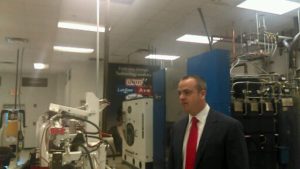Posted on July 15, 2017
by walterljohnsonii@yahoo.com

By Walter L. Johnson II
Diagnosing-as well as controlling, diabetes-has always been a challenging task over the years, regardless of where patients reside in the United States.
But in Southwest Georgia, dealing with this deadly disease can have a special sense of urgency.
That’s where the Diabetes Coalition of Southwest Georgia-led by family medicine physician Derek Heard, M.D., and Tracy Suber, director of the Diabetes Resource Center at Phoebe Putney Health System of Albany-comes in.
Socio-economics plays a major role in diabetes awareness-or lack thereof-according to Heard.
“Part of the problem, I think, is that we’re dealing with a socioeconomic problem,” Heard said. “When (patients have been) diagnosed with (diabetes), it’s been difficult for them to either afford the medications that treat diabetes, or they’re not able to go to a diabetes education center that teaches them about the disease process in of itself.
“But I think a lot of this has to do with the fact that we’re in a region that is disproportionately underserved from a standpoint of resources.”
Despite having all of the information that patients can have access to, diabetes can still be a difficult disease to diagnose and treat, added Heard.
“Even if you have all of the resources available, it’s still difficult to treat. If you don’t have some of those resources, whether it’s insurance to pay for doctor’s visits, or insurance to pay for medication, then (diabetes) becomes even more difficult to treat, and that’s what we’re seeing in Southwest Georgia.
As director of the Diabetes Resources Center, Suber plays a significant role in helping diabetics better understand the disease they’re doing battle with.
“We see patients that come into the office, and we complete an assessment on them, and determine what their needs are, and then we try to meet where they might need assistance, whether it be education on their disease, whether they’re a pre-diabetic, or someone who is actively fighting diabetes, or it could be an individual who’s pregnant with diabetes,” Suber said.
Suber added: “We help provide that education about their disease process, and also about their medication (s), if they’re on medications, about their diet. Some people might need (just) a little bit of education, (while) some people might need a lot.
“We try to figure out where (diabetics) are (in the treatment process), and help them on their pathway.”
With anywhere between 15 to 25 percent of diabetes patients being functionally illiterate, the need to address gaps is even more critical, said Suber.
“What we hope to do in our efforts with the Southwest Georgia Diabetes Coalition is to brainstorm about how we can better educate those individuals,” Suber explained. “It could be that some of the resources that we’re giving them may not be on the educational level they need to be.
“It will be trying to determine what the barriers are, and break through those barriers.”
Any successful treatment of diabetes requires constant activity, as well as awareness, and asking as many questions as possible,” says Heard.
“If you have access to your doctor, be proactive,” Heard explained. “Am I at risk for diabetes, am I at risk for prediabetes? What does that mean?
“If I am prediabetic, is there anything I can do to prevent progression to diabetes? If I am a diabetic, what can I do to keep my diabetes under better control, so I don’t get the long-term effects of diabetes?
“Be proactive, you are your best advocate. Talk to your doctor, don’t be afraid to have that conversation, don’t be afraid to talk, because sometimes ignorance is not bliss. Out of sight does not mean out of mind.
“Talk with your doctor, talk to family members, and be proactive in your own medical treatment.”
On The Web:
Phoebe Diabetes Resource Center: http://www.phoebehealth.com/services/diabetes-center/diabetes-center-home-diabetes-care
Like this:
Like Loading...





